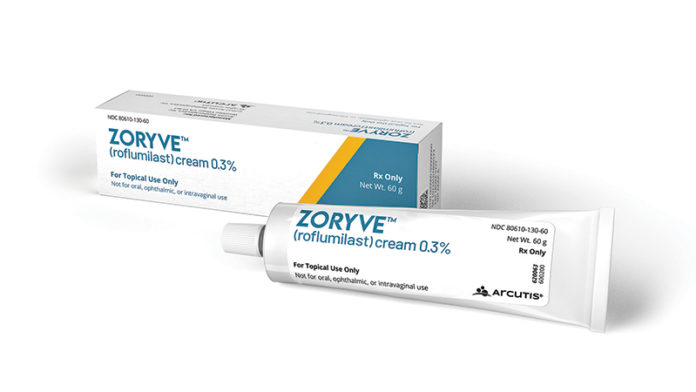In a benchmark moment for Arcutis Biotherapeutics, the company launched its first commercial product last week, after receiving FDA approval for the topical plaque psoriasis treatment in late July.
The cream drug, called roflumilast, won approval from the FDA under the brand name Zoryve. It will follow an open distribution model in stores including CVS, Walgreens and Ralph’s, as well as dermatology specialty outlets such as Alto Pharmacy. Arcutis will also make the medication available through Zoryve Direct, specialty pharmacies for patients that will provide the drug and assist with insurance.
Zoryve’s features and its $825 price point needed to be distinct, as Arcutis is the second regional company in three months to receive FDA approval for a topical cream to treat plaque psoriasis. The other company, Long Beach-based Dermavant Sciences, announced in late May that the FDA had approved its Vtama (tapinarof) cream for the treatment of the condition. Dermavant’s medication costs $1,325 per tube.
“We want to try and help as many people as possible,” said Frank Watanabe, Arcutis’ president and chief executive officer. “We’re a for-profit business but we can make money by helping more people. We’re focusing on a high-volume versus high-margin sort of strategy and that is really a core part of our commercialization strategy.”
There have been no head-to-head scientific studies comparing the companies’ respective treatments, but Watanabe wrote in an email to the Business Journal that there are key differences.
“[Zoryve] is the only topical to specifically study and demonstrate efficacy in treating psoriasis in intertriginous areas as measured by Intertriginous IGA (I-IGA),” he wrote. “Common sites of intertriginous psoriasis, where skin touches skin, are stomach folds, the groin, or armpits.”
He added that Zoryve is the first and only topical PDE4 inhibitor for the treatment of plaque psoriasis. PDE-4 is an intracellular enzyme that increases the production of proinflammatory mediators and decreases the production of anti-inflammatory mediators.
Conversely, Dermavant reported that the approval of their Vtama cream made it the first and only FDA-sanctioned steroid-free topical medication in its class. The company also said that the cream provides efficacy across 52 weeks and can be used on all bodily areas, including sensitive locations such as the face, skin folds, neck, genitalia, anal crux, inflammatory areas and armpits.
Difficult process
Watanabe said the about six-year development period of Zoryve was a process filled with challenges that included the cream’s molecule being extremely difficult to work with. The molecule did not like water, so it took roughly six months for Arcutis to come up with a way to make the molecule into a cream.
Outside of the lab, the licensing of the molecule needed to formulate the cream also hit a snag.
“We started working on Roflumilast and the molecule was owned by a Japanese drug company called Takeda, and just about the time we started working with them, they sold all of their respiratory franchise to AstraZeneca and Roflumilast went along with it,” Watanabe said. “Then we had to start off again at square one with AstraZeneca to get the license to the molecule.”
Takeda Pharmaceuticals has a presence in Thousand Oaks. Last year, the publicly traded company invested $126 million to expand its facility in the city, adding manufacturing operations.
COVID-19 also presented an obstacle for Arcutis, which went public less than two months before the respiratory illness was declared a pandemic. Arcutis’ clinical trials were slightly disrupted by the crisis, which also persisted as the company was raising funds. However, according to Watanabe, the firm is still well capitalized.
Watanabe credited the company’s perseverance to its strategy and team, noting that Arcutis prioritized biologically validated targets and built a team with deep dermatology expertise.
“Sticking to that strategy from the very beginning is I think what allowed us to weather these challenges and to develop Zoryve very quickly by drug industry standards, (as) six years is quite fast,” Watanabe said. “And for a relatively modest amount, and I emphasize relative, because it’s been something like $500 million we have already spent to date.”
Valley presence
The construction and quality of the company’s employee roster were helped by Arcutis being based in the biotech hub of the San Fernando Valley, according to Watanabe, who said that roughly a third of Arcutis’ staff are in the region. He recalled early debates about whether Arcutis should be in San Francisco, a decision that Watanabe said would have been too costly for the company.
“I said that I thought it was the right thing to do for the company to put the office in Westlake Village,” Watanabe said. “And I don’t think anyone on the board would dispute that decision now; it’s worked out very well for the company.”
Arcutis’ work is far from over, despite the FDA approval and launch of Zoryve, because it has multiple drugs in its pipeline.
The medication that is currently furthest along is a foam version of Zoryve for the treatment of seborrheic dermatitis, a condition that mainly impacts the scalp and produces red skin, scaly patches and dandruff.
The company has completed a phase-three study for the treatment and plans to file for approval next year.
Watanabe anticipates that if all goes according to plan the foam will launch late next year or early in 2024.
Arcutis’ cash runway is in a solid position to fund the launch of its new product and continue clinical trials.
In total, the company has about $570 million to work with.
“We’re in a very good position financially and I think particularly, given the challenges a lot of biotech firms are facing right now in terms of cash runway and financing, we’re feeling very fortunate that our investors have been so supportive,” Watanabe said.
